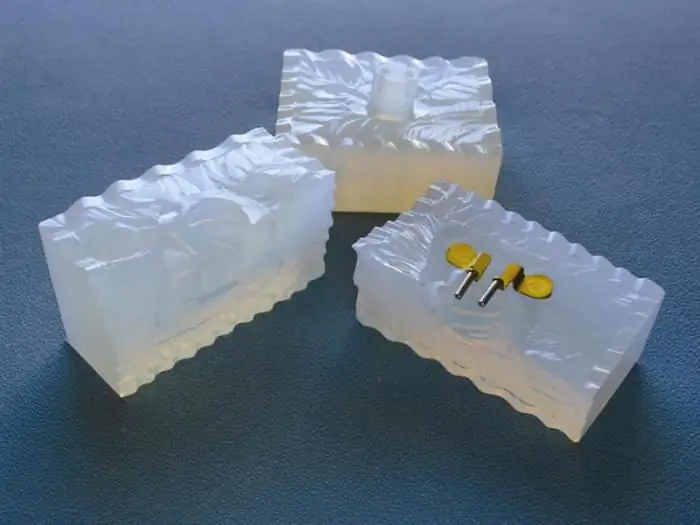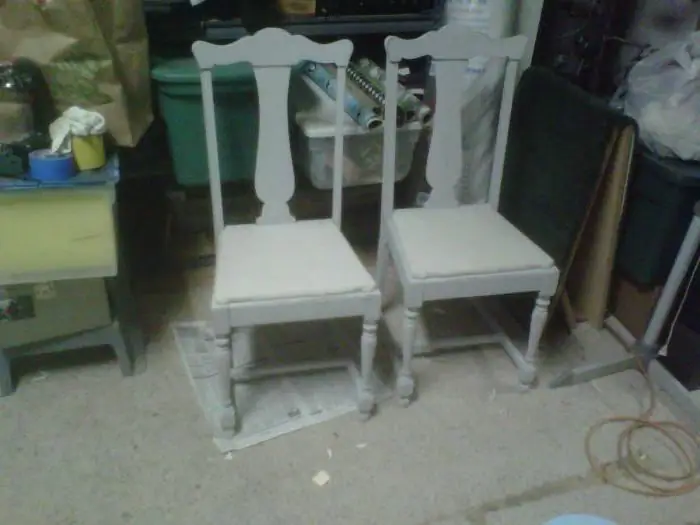2026 Author: Howard Calhoun | calhoun@techconfronts.com. Last modified: 2025-01-24 13:10:43
Furniture production in our country is very well developed. There are many companies that make cabinets, tables, headsets, etc. Consequently, competition in this market segment is unusually high. In order to make a good profit, enterprises of this specialization need to pay maximum attention to both the quality of their products and their appearance. Simply put, the furniture should be not only solid, but also beautiful. In order to achieve this, of course, it is necessary, first of all, to use high-quality machines in production.

Machines for making blanks
Specialized enterprises use furniture production equipment such as:
- Format machines. This equipment is designed specifically for cutting MDF or chipboard.
- Milling and copying machines. They are necessary for applying a certain relief to the plates.
- Presses for the production of bent facades.
- Grinding machines. They are necessary for processing partsfacades when applying paint or varnish.
Also in furniture production, a vacuum-membrane press is used without fail, which will be discussed in this article. This equipment is used for pasting the facades of cabinets and sets with decorative PVC film or veneer. Modern machines of this type have a fairly simple design and are also easy to use.

Basic design elements of a vacuum machine
The arrangement of this type of equipment is not too complicated. Any such machine consists of five main elements:
- Table on which furniture blanks are laid out. Its surface is usually sheathed with a metal sheet or thick tin.
- Vacuum pump.
- Clamping frame. This press element is also made of durable metal.
- Heating unit. Different presses use different types of this equipment. The heating unit can be infrared or contact.
- Actually the press itself. It can be made in the form of a hinged or rolled cover.
Additional structural elements
Vacuum such equipment is called because the dense pressing of the film to the blanks in it is carried out by complete pumping out of the air from under it. From the end of the table in such equipment there are shafts (one or more) for rolls of PVC film. In order for the workpieces to fit the material as tightly as possible, they are placed on special substrates on the table. When finishingMDF or chipboard veneer additionally uses a special glue. The press is controlled using an automatic remote control. At the same time, the operator has the ability to manually configure the equipment.

Types of presses
Only two main types of such machines are currently used in enterprises:
- Actually vacuum press. Used for finishing furniture blanks in a gentle way. Such installations can provide a pressure of no more than 0.95 kg/cm2.
- Vacuum with additional pressure. Such equipment is much more expensive. At the same time, it can provide pressure up to 8.5 kg/cm2.
The first variety is usually used for gluing PVC film or for veneering simple blanks. Vacuum presses of the second type are used for facing MDF furniture parts with a complex configuration.
Membrane for presses
Both types of vacuum machines are usually supplemented with a special membrane. It is used most often when pasting blanks with veneer as an additional “press” that prevents unwanted movements during work. Also, the membrane is used when finishing parts with very thin films that do not tolerate extreme temperatures. This element is attached to hooks located along the perimeter of the clamping frame.

In such a sphere of the national economy as furniture production, only two mainmembrane types. Most often, these elements are made of rubber. Sometimes durable silicone is also used. The latter is obtained by vulcanization, and therefore, it has all the qualities of natural rubber. At the same time, silicone also has a greater degree of wear resistance.
Among other things, the use of a rubber or silicone membrane in the press allows:
- veneer very small parts;
- reduce film waste.
Foil finishing
The procedure for pasting furniture blanks with PVC material using equipment such as a vacuum membrane press includes the following steps:
-
The substrates are neatly laid out on the surface of the table. At the same time, technological gaps of several centimeters are left between them. This is necessary because during the pressing process, the film is stretched and compresses, including the ends of the blanks along the perimeter. Without gaps, this becomes simply impossible.
- Workpieces are laid on the substrates: cabinet doors, drawer slats, parts of the facade, etc.
- The table with blanks is completely covered with a PVC film rolled off the rollers.
- A pressure frame is lowered onto the film along the perimeter, stretching and straightening it.
- Depending on the design, the press itself is lowered from above or advanced from the side.
- The operator sets the temperature and pressure values required by the technology on the control panel and turns on the equipment. After that the filmstarts to warm up. As soon as its surface reaches a certain temperature, the vacuum unit is turned on. Air begins to be pumped out from under the film (at a given pressure and a certain speed).
- After the set time has elapsed, the operator turns off the press and folds it back (or moves it back).
- Next, the glued film is trimmed around the edges. In this case, a specially designed knife is used, which eliminates the risk of damage to the coating of the workpiece.
You can't violate this technology in any way. Otherwise, the blanks will be finished poorly. In addition, in the near future, it may be necessary to carry out such a costly operation as the repair of industrial equipment.

Veneer finish
In this case, the lining procedure is approximately the same. The difference lies in the fact that the workpiece is smeared with special glue before the veneer is applied. Substrates in this case are usually not used. A membrane is put on the frame. They hold the press when veneering on the workpiece longer than when laminating - about 7-10 minutes.
How to choose
When buying equipment such as a vacuum membrane press, you should first of all pay attention to such parameters as:
- Pump brand. Vacuum presses can be equipped with Italian models or domestic ones. The former increase the cost of equipment, but at the same time they are more reliable. Domestic vacuum pumps are also sufficientreliable. In addition, the repair of industrial equipment of this type will not become a problem for the owner of the workshop in any case. It will not be difficult to get all the necessary components and parts.
- Material used to cover the table. It is important to ensure that it is metal. Some manufacturers sheathe tables with chipboard sheets. In the process of cutting the film, such an impractical coating can be easily damaged.
- Dimensions. This is perhaps the main characteristic of the presses, which should be paid attention to. Large-sized equipment allows you to process a lot of workpieces at one time. However, these presses are quite expensive. In addition, in small workshops, working with them may not be very convenient. Today, there are also presses with two working tables on the market. This type of equipment is most suitable for large-scale furniture production. You will have to pay less for a small press, but, of course, its productivity will also be less.
- Type of heaters. The most practical is the equipment equipped with KGT lamps. Such presses do not burn the film in the upper part of the bent parts. When using equipment with heating elements, it is necessary to ensure that the distance to the highest point of the workpiece is at least 150 mm.
- Brand of the manufacturer. Buying equipment from an unknown manufacturer, of course, is not worth it.

Price of presses
How much can it cost on the marketmembrane vacuum press The price of machines of this type depends mainly on their dimensions, design features and the brand of the manufacturer. Small models designed for use in small businesses cost about 300-500 thousand rubles. The price of large-sized equipment installed at large furniture factories fluctuates between 3-4 million rubles.
Also on the market you can often find used equipment of this specialization. Such equipment costs a little less - 200-300 thousand rubles.

Choosing the most suitable vacuum membrane press for a particular application, so it will be quite easy if necessary. Equipment of this type in the modern market is very widely represented. The most important thing is to determine the dimensions of the unit and pay attention to the features of its design. In this case, you can purchase the most suitable, productive and reliable model.
Recommended:
Damascus steel - history and manufacture

Damascus steel is one of the most popular steel used to create blades. Products from this alloy are characterized by a unique pattern and excellent cutting properties
Casting in silicone mold: equipment. Vacuum casting in silicone molds

For the manufacture of a small number of plastic blanks, vacuum casting into silicone molds is most often used. This method is quite economical (making a metal mold requires more time and money). In addition, silicone molds are used repeatedly, and this also significantly reduces the cost of production
Production in the garage: ideas from Europe, photo. Manufacture of furniture, mirrors, key chains, souvenir magnets, watches in the garage

Most people have thought about starting their own business at least once in their lives. What can a simple man in the street do, especially if he does not have a lot of capital, but there is an idle garage?
Kalinkovichi Furniture Factory: high quality comfortable furniture

Kalinkovichi Furniture Factory offers furniture for a carefree comfortable life. In any room of the house will be cozy with cozy sets that successfully complement the style of the room
How to sell furniture? What furniture retailers need to know

An unprofessional seller who is unable to answer not only objections, but also simple customer questions about cost, packaging and discounts on goods is a fairly common occurrence. Too intrusive and illiterate “specialists” are also often encountered, from which, as if from a cornucopia, product characteristics are pouring in that are uninteresting to the buyer and do not meet his needs

